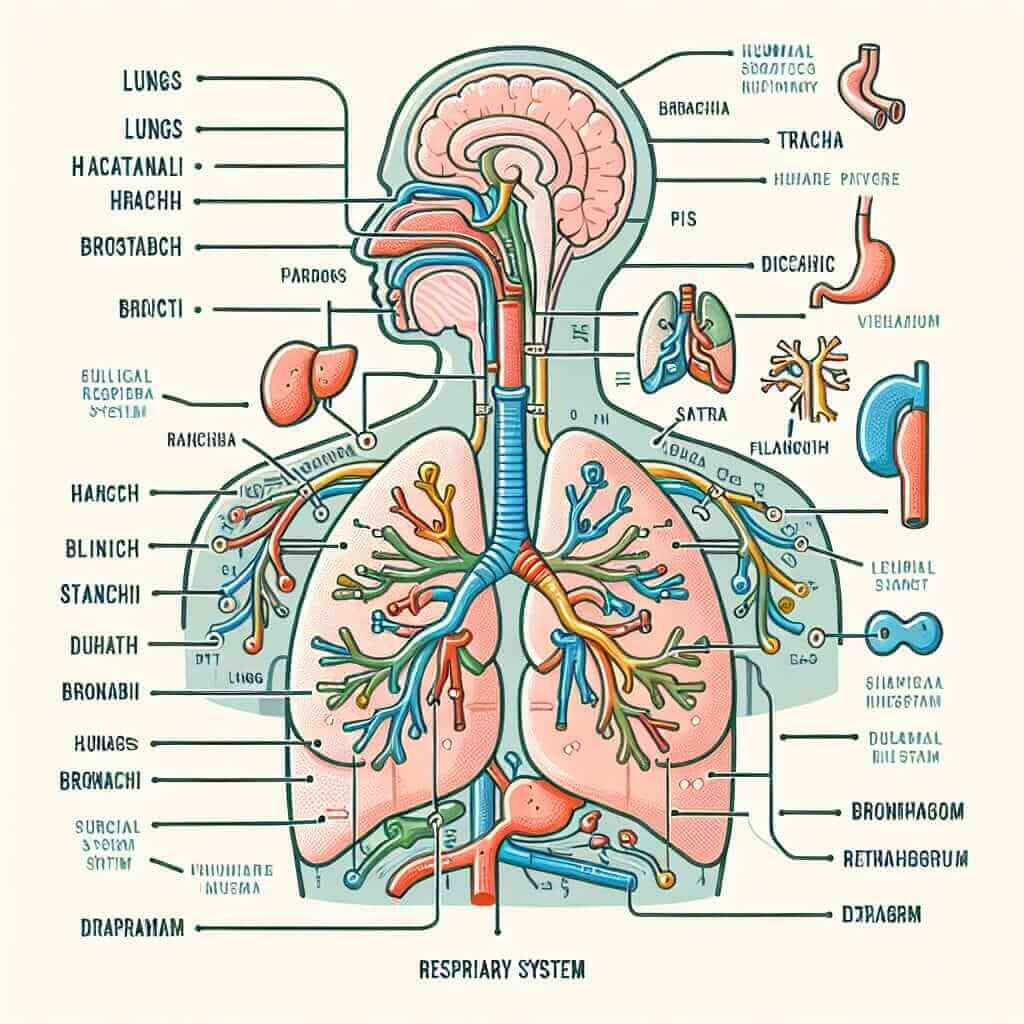The respiratory system is a common topic in the IELTS exam, particularly in the Listening and Reading sections. Mastering vocabulary related to this system is crucial for achieving a high score.
Here are some synonyms for “respiratory system”:
- Respiratory tract (n.): The passageway for air from the nose to the lungs. Example: Smoking damages the respiratory tract.
- Breathing system (n.): A more informal synonym for the respiratory system. Example: Asthma affects the breathing system.
- Pulmonary system (adj.): Related to the lungs. Example: Pulmonary diseases are a leading cause of death worldwide.
Understanding the Respiratory System
The respiratory system is responsible for taking in oxygen and expelling carbon dioxide. It includes organs and tissues that work together to facilitate breathing.
Key Components and Functions:
- Lungs: The primary organs of respiration, responsible for gas exchange.
- Trachea (windpipe): A tube that carries air to and from the lungs.
- Bronchi: Two branches of the trachea that lead to the lungs, further dividing into smaller bronchioles.
- Alveoli: Tiny air sacs in the lungs where gas exchange occurs.
- Diaphragm: A muscle that helps control breathing by expanding and contracting the chest cavity.

Common Respiratory Conditions:
- Asthma: A chronic condition characterized by airway inflammation and narrowing, leading to wheezing, shortness of breath, and coughing.
- Pneumonia: An infection of the lungs that causes inflammation in the alveoli.
- Bronchitis: Inflammation of the bronchi, leading to coughing and mucus production.
- Emphysema: A lung condition that damages the alveoli, making it difficult to breathe.
Using Respiratory System Vocabulary in the IELTS Exam
Listening Section:
You might encounter lectures or conversations about health, biology, or environmental issues that mention the respiratory system.
Example:
In a lecture about air pollution, you might hear:
“Long-term exposure to air pollution can have detrimental effects on the respiratory system, leading to an increased risk of developing respiratory diseases like asthma and lung cancer.”
Reading Section:
Passages on health, biology, or the environment may discuss the respiratory system in detail.
Example:
A reading passage about the effects of smoking might state:
“Smoking is a leading cause of chronic obstructive pulmonary disease (COPD), a group of respiratory diseases that cause airflow blockage and breathing-related problems.”
Writing Section:
You might need to write about health or environmental issues where knowledge of the respiratory system is essential.
Example:
Task 2 essay topic:
“The increasing levels of air pollution pose a significant threat to public health.” Discuss.
In your essay, you could discuss the impact of air pollution on the respiratory system, providing specific examples of respiratory illnesses caused or exacerbated by air pollution.
Speaking Section:
During the speaking test, you might be asked about your health, lifestyle habits, or environmental concerns, providing opportunities to use respiratory system vocabulary.
Example:
“Do you think air quality is a concern in your hometown?”
You could respond by saying:
“Yes, air quality is a growing concern in my city. The increasing number of vehicles and industrial emissions contribute to poor air quality, which can negatively impact the respiratory health of citizens, particularly children and the elderly.”
Collocations and Idioms:
- Shortness of breath: Difficulty breathing. Example: He experienced shortness of breath after climbing the stairs.
- Take a deep breath: To inhale a large amount of air. Example: The doctor asked her to take a deep breath and hold it.
- Catch one’s breath: To rest after strenuous activity. Example: She stopped to catch her breath after running up the hill.
- Out of breath: Breathing heavily due to exertion. Example: He was out of breath after running to catch the bus.
Conclusion
Understanding and using vocabulary related to the respiratory system is essential for success in the IELTS exam. Familiarize yourself with the key components, functions, common conditions, and related vocabulary to enhance your comprehension and ability to express yourself fluently and accurately. Regularly practice using these terms in context to boost your confidence and improve your performance in all sections of the exam. You can find more useful vocabulary and practice exercises on websites like ielts.net to further improve your understanding of this topic.